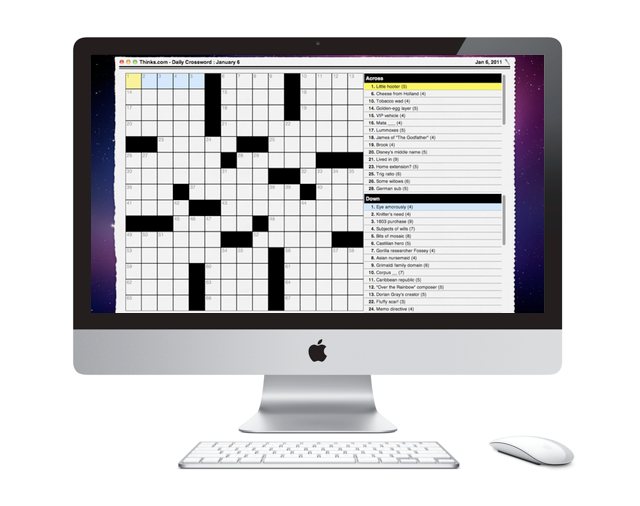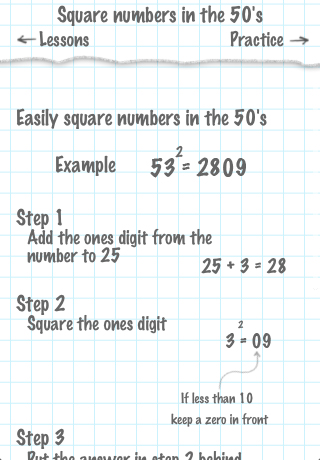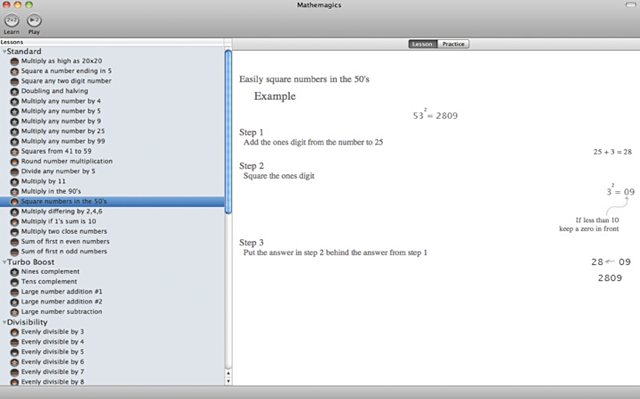
The Mac App Store is, by most accounts, off to a good start. But not all entrenched Mac developers are ready to entrust their entire business to Apple's recently opened digital distribution point due to certain restrictions placed on how apps are packaged and how they access certain system resources. However, several mobile developers—already accustomed to App Store life—have begun to bring their iOS-only apps to the Mac platform thanks to the ease of porting and their comfort with the app store model.
The trend is the reverse of what happened when Apple launched the iOS SDK in 2008. Then, many developers leveraged the underlying development similarities—including the Objective-C language, available frameworks, and Xcode IDE—to build mobile versions of desktop apps. Ars spoke with the developers behind Chopper 2, Crosswords, Mathemagics, and The Incident to find out what was involved in moving from small, fixed-size touchscreens to large, variable-size screens and keyboard-and-mouse input.
Mac App Store: an enabler
The developers Ars spoke with told us that the Mac App Store was a big factor in the decision to bring their iOS apps to the Mac. Matt Comi, programmer for Big Bucket's 8-bit homage The Incident, said that the game would not have come to Mac OS X without it. (Comi coded The Incident with help from artist Neven Mrgan with music by Cabel Sasser, both of whom have day jobs at Panic.)
"We don't have a sales or management flow in place except for the App Store," Comi told Ars. "Building our own sales channel would've been more work than we could take on."
The situation was very similar for Blue Lightning Labs, developer of learning app Mathemagics. "I had considered bringing Mathemagics to the Mac in the past but it was never a high priority," Blue Lightning's Shane Crawford explained. "Considering the challenges in marketing an app on the Web, creating and maintaining my own store, and the development time involved, it just didn't seem worth it. When the Mac AppStore was first announced I knew immediately that I would bring Mathemagics to the Mac."
Other developers had already been planning Mac OS X releases, but the Mac App Store helped push release plans up to get in on the store's launch. "We'd been considering moving Crosswords to the Mac for a while, and had done some of the initial planing work," Stand Alone's Ben Gottlieb told Ars. "The Mac AppStore merely accelerated the process."

Majic Jungle's Dave Framton said that he was also planning to release a Mac OS X version of his successful iOS game Chopper 2 this year, but wanted to take advantage of being in the Mac App Store at launch. "I knew I absolutely had to be there on launch day, and being one of the launch titles was invaluable [to business]," Framton said.
Porting ease
Porting was, in most cases, pretty easy for the developers we spoke with. While interfaces had to be adjusted for different input methods and in some cases re-factored for higher resolutions or different aspect ratios, most iOS code was reusable on Mac OS X.
"We got lucky with Crosswords, Gottlieb said. "It's got a pretty basic UI that lends itself well to both a simple mobile design—one puzzle list, one puzzle—and a more flexible desktop layout—one puzzle list, many puzzles."
Frampton spent about a month adapting the controls and UI for Chopper 2 for Mac OS X. Most of the work, he said, was developing a way to let the iPhone function as a controller. And of course, textures and models had to be updated for higher resolution screens. Still, Frampton told Ars, "with the iPad and Retina Display devices, I had already done much of the work to support resolution independence."
Comi said that much of the control adaptation for The Incident was "nearly trivial." The biggest challenge was adapting to 16:9 and 16:10 displays common on the Mac. A recent update to The Incident allowed connecting the iPad version to a widescreen HDTV, though, so Comi was able to adapt the bitmapped artwork used for that feature to build the Mac OS X version.
Still, many games rely on more or less custom UIs, making porting that much easier. Other applications require more care in moving from a mobile device to the desktop.
"It is a mistake to try a direct port from iOS to the Mac just like it is from the iPhone to the iPad," Crawford explained. "They are different platforms and they demand different considerations."
For instance, Crawford said, iOS apps are generally designed to launch, do a few tasks quickly, and quit or be interrupted by some other task. Mac apps, on the other hand, are often used for much longer sessions. "These two simple facts drive a lot of design decisions between the two platforms," Crawford told Ars.


"At first I started to style the Mac version of the app after the iPhone version, but after about a week of work I realized that it just wasn't fitting the aesthetics of the Mac," Crawford said. "I ended up with a more traditional Mac Cocoa look and feel, changing the flow of the app by flattening the depth of navigation within the app by combining many screens and expanding their focus."
Mac and iOS sales are complementary
So far, developers seem happy with the results they are seeing from the Mac App Store. "The initial sales have definitely been better than expected," Frampton said.
"I hoped they would be good, I dreamed they would be good—I wasn't let down," Crawford said. "Mathemagics premiered at number nine in the Education category and eventually made it well into the Top 100 overall."
These developers warned, however, that it wasn't fair to make direct comparisons with the iOS App Store at this early stage. For one, every iOS device has access to the iOS App Store, while only those who applied the Mac OS X 10.6.6 update can access the Mac App Store. And, as Crawford pointed out, there are more iOS devices in active use than there are Macs.
Frampton compared initial sales volumes to the early days of the App Store on the iPhone. "The overall size of the market seems very similar to the early days of the iOS App Store, and in fact I get a very distinct feeling of déjà vu," he said. "The Mac App Store market may never catch up, but it certainly has a lot of room to grow."
"Sales tend to eventually level out and that's yet to happen on the Mac App Store," Comi agreed.
But even with a lower overall sales volume, developers can still earn reasonable profits. Price points overall tend to be higher on the Mac App Store compared to iPhone apps. "A full-featured Mac app is a ton of work, so a higher price point is deserved, and I think Mac users realize that," Crawford told Ars.
And for developers who have a version in both the Mac App Store and the iOS App Store, sales of one version can be complementary to the other. "I have seen a positive feedback loop to the iPhone version of Mathemagics from the Mac version," Crawford said. His Mac app was featured as a top pick from the Mac Apps Store in Macworld magazine, which drove sales of the Mac OS X version. "Coinciding with that event, the sales of the iPhone app picked up and even eclipsed that of the Mac version."
"There is no doubt that the Mac App Store opens up an entirely new market, and iOS developers are ignoring a huge opportunity if they are not considering a port to the Mac." Frampton said.
reader comments
102